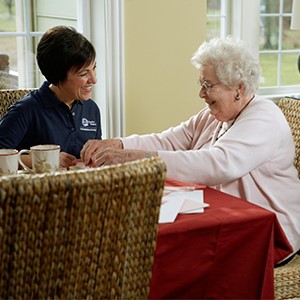With hospitals facing Medicare penalties for high rates of readmissions for specific diseases, doctors and other medical personnel are seeking ways to reduce the chance that seniors land back in the hospital after an initial stay. Nearly one-fifth of all Medicare patients in the United States who are discharged from the hospital end up returning to the hospital within 30 days. There are many reasons seniors may need to be readmitted to the hospital, but those that have garnered the greatest interest are preventable causes.
Research indicates that caregivers are critical in helping seniors overcome some of the main preventable causes for returning to the hospital. Consider the following:
· Many seniors are unable to appropriately follow prescribed medication schedules. When you consider that, on average, seniors with chronic conditions fill 50 different prescriptions annually, it is not difficult to imagine how someone could get confused about the new medicines prescribed by hospital medical staff. Caregivers can not only remind seniors to take medications as prescribed, but they can also help seniors keep a list of those medications and their dosages so the information is readily available when the older adult visits the doctor.
· Failing to follow up with the primary care physician after a hospital discharge is also a main reason for hospital readmissions. A full two-thirds of patients readmitted to the hospital would have avoided that trip if they had seen their physicians within two weeks for follow up. The reasons for not following up vary but can include transportation difficulties and forgetting to make or keep appointments. Hospital staff can aid the senior by setting up appointments for the individual before discharge, and caregivers can help ensure that the senior gets to those appointments on time.
· Having a discharge plan for the senior before he or she leaves the hospital can be crucial for recovery, but when a person is ill, it is difficult to focus on critical information. Caregivers can make an impact when armed with the senior’s discharge plan. They can help the senior follow the plan and notify the family or other approved individuals when there are problems or changes with the senior. They can also help explain the information or ensure that the appropriate persons are notified if the older individual has questions about his or her course of treatment. This takes the stress off of the senior so he or she can focus on recovery.
While some seniors may have family and friends to help them once they leave the hospital, many do not. In these cases hospital staff often take measures to ensure the senior has the assistance of a professional caregiver before the senior leaves the hospital. Even those who have the assistance of friends and family can benefit from a professional caregiver during those times that family caregivers are unavailable. For more information on how in-home care can help seniors recover from a hospital stay, contact your nearest Comfort Keepers® office today.
References
American Hospital Association. (September 2011). Examining the drivers of readmissions and
reducing unnecessary readmissions for better patient care 2011 AHA Policy Research.
Retrieved from http://www.aha.org/research/policy/2011.shtml.
Robert Wood Johnson Foundation. (February 2013). Ten things you should know about
care transitions. Retrieved from
http://www.rwjf.org/content/dam/farm/toolkits/toolkits/2013/rwjf404086.
– Stephen Rudolph

